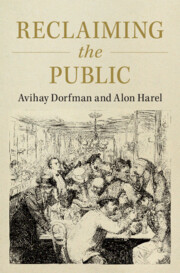Description
Reclaiming the Public
Authors: Dorfman Avihay, Harel Alon
Language: English
Subject for Reclaiming the Public:
Reclaiming the Public
Publication date: 02-2024
208 p. · Paperback
Publication date: 02-2024
208 p. · Paperback
Reclaiming the Public
Publication date: 02-2024
208 p. · Hardback
Publication date: 02-2024
208 p. · Hardback
Description
/li>Contents
/li>Biography
/li>
Reclaiming the Public defines and defends the intrinsic value of ?the public? that resides in our public institutions and the officials that run them. The book argues that public institutions do not simply act for us but instead speak and act in our name; i.e., they represent us. Representation requires that decisions made by public institutions or officials are consistent with the perspectives of citizens. If the decisions satisfy this requirement, these decisions are attributable to citizens, and citizens can be held responsible for them. This theory of political authority accounts for major features of our legal system, such as the non-instrumental grounds for the separation of law-making powers, the non-instrumental value of constitutions, the limits of privatization, the nature and value of public property, and the impermissibility of using artificial intelligence in setting certain policies and making certain decisions.
1. A Public Conception of Political Authority; 2. Law as Standing; 3. Speaking in a Different Voice: The Necessity of Institutional Pluralism; 4. Inherently Public Goods; 5. Against Privatization As Such; 6. Public Ownership; 7. Why Not Artificial Intelligence? The Normative Status of Public Algorithms; Concluding Remarks.
Avihay Dorfman is a law professor at Tel Aviv University. His studies elaborate the non-contingent implications of the law for the possibility of establishing forms of valuable interactions between, and among, persons. Dorfman is the co-author of Relational Justice: A Theory of Private Law (2024).
Alon Harel holds the Mizock Chair at the Hebrew University of Jerusalem. Harel has written extensively on political, legal and constitutional theory. In his recent work, he has shown that legal institutions and procedures have intrinsic rather than instrumental value. He is the author of Why Law Matters (2014).
Alon Harel holds the Mizock Chair at the Hebrew University of Jerusalem. Harel has written extensively on political, legal and constitutional theory. In his recent work, he has shown that legal institutions and procedures have intrinsic rather than instrumental value. He is the author of Why Law Matters (2014).
© 2024 LAVOISIER S.A.S.



